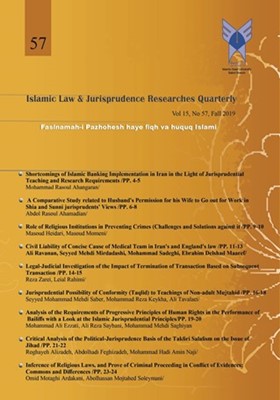A Comparative Study related to Husband's Permission for his Wife to Go out for Work in Shia and Sunni jurisprudents' Views
Subject Areas : Private law
1 - Assistant Professor, Department of Jurisprudence, Imam Bagher University, Qom, Iran
Keywords: Permission, Women employment, Condition of marriage, Shia and Sunni jurisprudents', views, Going out of the house,
Abstract :
Women's employment has become increasingly unavoidable in today's world. However, it is impermissible for a wife to go out for work except with her husband's permission, otherwise it can be considered as her disobedience or her refusal to fulfil her marital duties "NASHUZ''. Concerning the wife's permission restriction to get out of the house, a group of Islamic jurists believes in the absolute necessity of receiving such permission from the male spouse while another group argues that it is permissible for the female spouse to go out unless it contradicts with her "absolute sexual submission". After all, the female spouse can get out of the house and work if needed. All Islamic religious parties are in consensus that if the female spouse employment - whether at home or away - is in full contradiction with the absolute right of male spouse regarding wife's sexual submission, it basically needs the consent of the male spouse in this respect. Shia and Sunni jurists share the same view that female spouse employment should not be conflicted with the interests of the family, nor with the dignity of both spouses, nor with the duty of parenting and strengthening the family. Having responsibility for providing care and support for the family, the male spouse can monitor and manage his wife's commute. Furthermore, according to the principle of free will, the female spouse can take possession of her properties while her husband has no right to interfere in her personal affairs, although the consent of her husband is considered to be a virtue. The employment option and the permission to get out of the house, as the condition of marriage, can be included in the prenuptial agreement or marriage contract by the female spouse.
قرآن کریم.
_||_
Ahmadian, A., Moradkhani, A., Ahmadi, M., & Abedian, H. (2017). A comparative study related to husband's permission for his wife to go out in Shia and Sunni jurisprudents' views. Journal of Studies in Islamic Law & Jurisprudence, 12(42), 11-28.
Ameli Z. (1993). Masalik Al-Ifham. Qom: Al-Maaref Al- Islamiyah Publishing.
Ameli, M.T. (1993). Al-Makasib Wa Al-Bay. Qom: Nashr Al -Islam Printing.
Ansari, M. (1995). Al-Nikah. Qom: Baqeri Publishing.
Ansari, M. (2000). Al-Makasib. Qom: Baqeri Publishing.
Babawayh Qomi, A.I. (1984). Man lā yahzuruhū Al-faqīh. Qom: Al-Jameah Tul Modaresin Publication.
Bahrani, H. (1983). Hadaegh Al- Nazereh. Qom: Islamic Publications Office.
Bojnourdi, M.H. (1999). Al-Qawa'id Al-Fiqhiyah. Qom: Al-Hadi.
Broujerdi, H. (2007). Jamia ahadith Al-Shi'a. Tehran: Farhang Sabz Publishing.
Dardir, A. (No date). Dardir's Al-Sharh Al-Saghir 'Ala Qqrab Al-Masalik Ela Inadlihab Al-Imam Malik. Cairo: Dar Al-Ma'arif.
Fadhlallah, S.M. (2001). Taamolat Al-Islamiyah Hawl Almara'ah. Beirut: Darol Melak.
Hamiri, A.A. (1992). Qurb Al-Isnād. Qom: Al-Bayt Alaihi Salaam' Publishing.
Haskafi, A. (1995). Dur Al-Muhtar fi Sharh Tanwir Al-Absaar. Cairo: Dar AL-Fikr.
Hedayatnia, F. (2006). Women's employment and family expediency in civil law: judicial investigation on article 20 of the Islamic Civil Code. Women's Strategic Studies, 43, 7-8.
Helli, N.J.H. (2002). Khulasat Al-Aqwal fi Ma'rifah Ahwaal Al-Rijal. Najaf: Alhaidariya Printing.
Horr Ameli, M. (1988). Vasayel Al-shia Ela Tahsil Masael Al-Shariat. Qom: Al-Bayt Publishing.
Horr Ameli, M. (1988). Vasayel Al-Shia Ela Tahsil Masael Al-Shariat. Qom: Al-Bayt Publishing.
Hosseini Sistani, S.A. (1993). Minhaj Al-Salihin. (no location): (no publication name).
Ibn abedin, H. (1995). Radd Al-Muhtar Ala Al-Mukhtar. Qom: Dar-al-Fikr.
Ibn manzur, M. (1985). Lisan Al-Arab. (no location name): Dar Al-Turath Al-Arabi.
Ibn Sharaf Al-Nawawī, Z. (1997). Al-Majmu' Sharh Al-Mohadhdhab. (no location name): Dar Al-Fikr.
Isfahani Fazel Hendi, M. (1996). Hashiyat Kitab Al-Makasib. Qom: Islamic Publications Office.
Jabaie Ameli, Z, (1993). Masalik Al-Afham ila Tanqih Shara'i' Al-Islam. Qom: Al-Maaref Al- Islamiyah Publishing.
Janati, M.I. (no date). Tauzeehul Masail. Qom : Ansarian Publishing.
Katouzian, N. (1992). Family civil rights. Tehran: Inteshar Publication.
Kiyaei, A. (1986). Civil law and Fatwa of Imam Khomeini. Tehran: ( no location name).
Kulayni, A.J. (1987). Al-Kafi. Tehran: Darol Kutub Al-Islamiyah Publishing.
Madani, Y. (1983). Takmal Al-Wasilah. Qom: Esmailian Publishing.
Makarem Shirazi, N. (2004). Kitab Al-Nikah. Qom: Imam Ali Ibn Abi Talib Alayhi Salam Publishing.
Mehrpour, H. (2005).Certain issues on women's rights: from the point of view of domestic law, principles of Islamic jurisprudence and international law. Tehran: Etelaat Publishing.
Mohaghegh-Damad, S.M. (2008). Family Law (Marriage and its Dissolution). Tehran: Center for Publication of Islamic Studies.
Najafi, M.I.B. (1984). Javaher Al-Kalam .Tehran: Al-Maktabat Al-Islamiyah Publishing.
Naraqi, M.H. (1988). Avaed Al-Ayyam. Qom: Maktabatul-Basiri Publishing.
Nawawi, M.H. (1998). Sahih Muslim. Darul Manar: (no publication name).
Rahbar, M. (2014). Sharia domain of wife's absolute obedience. Judicial Studies, 1(1), 25-35.
Safaee, S.H. (2001). Family law. Tehran: Tehran University Press.
Sharbini, M.KH. (1958). Mughni Al-Muhtaj ila Ma'rifat Ma'ani Al-Minhaj. Cairo: Dar Al –Fikr Publication.
Simayee Saraf, H. (2001). Implicit condition. Qom: Bosstan Kitab.
Tabatabai, S.M. (no date). Mustamsak Al-'urwa Al-wuthqa. Beirut: Dar Ihyaut Torath Al-Arabi.


